If you’re looking to transform your relationship with food, I’ve found some of the best intuitive eating books that can really help. From the all-encompassing *Intuitive Eating, 4th Edition* to practical guides like *The Intuitive Eating Workbook* and daily inspiration in *Intuitive Eating for Every Day*, these resources focus on rejecting diet culture, building self-trust, and fostering body acceptance. There are also tailored options for teens, parents, and spiritual approaches. Keep going, and you’ll discover which one suits your journey best.
Key Takeaways
- The list features top books that promote a compassionate, evidence-based approach to ending dieting and improving body image.
- Resources include practical workbooks, daily reflection guides, and mindset strategies to support lasting behavioral change.
- Specialized options are available for teens, parents, and faith-based audiences, addressing unique needs and perspectives.
- These books emphasize rejecting diet culture and cultivating self-trust, body acceptance, and emotional healing.
- They provide accessible language, step-by-step guidance, and tools to foster a healthier relationship with food and oneself.
Intuitive Eating, 4th Edition
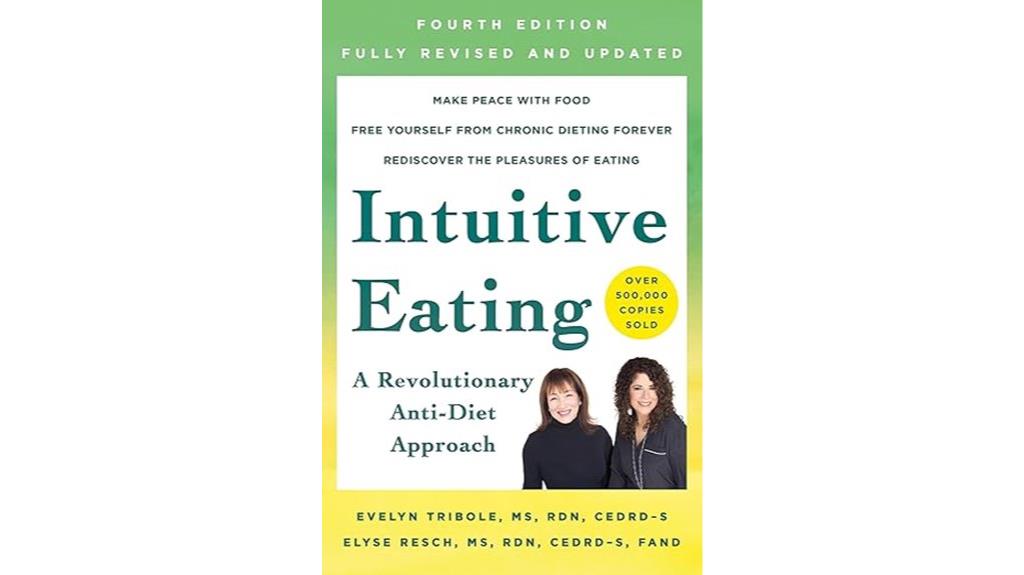
If you’re tired of dieting and looking for a compassionate, science-backed approach to food and body acceptance, *Intuitive Eating, 4th Edition* by Evelyn Tribole and Elyse Resch is an excellent choice. This book challenges diet culture, emphasizing listening to your body’s hunger and fullness cues while rejecting the ideas of good or bad foods. It promotes self-compassion, enjoyment of movement, and respecting your current body. The authors highlight that diets are often ineffective and can cause emotional and physical harm. Instead, it offers practical, research-supported strategies to foster a healthier, more joyful relationship with food and yourself.
Best For: individuals seeking a compassionate, science-based approach to ending dieting cycles, improving body acceptance, and building a healthy relationship with food.
Pros:
- Emphasizes rejecting diet culture and fostering self-compassion.
- Provides practical, research-supported strategies for intuitive eating.
- Supports long-term well-being and enjoyment of food and movement without guilt.
Cons:
- Some sections may feel dense or repetitive for certain readers.
- Advice on raising intuitive eaters may not be universally applicable.
- The focus on scientific research can be heavy for those seeking quick, simple tips.
The Intuitive Eating Workbook: Ten Principles for Nourishing a Healthy Relationship with Food

The Intuitive Eating Workbook stands out as an excellent choice for anyone seeking a practical, self-guided approach to rebuilding a healthy relationship with food. It’s praised for being all-encompassing, easy to read, and life-changing. The workbook helps recover from disordered eating, boost mental health, and develop body acceptance by emphasizing patience, self-care, and listening to internal cues. It challenges diet culture, promoting rejection of restrictive dieting and external validation. The exercises foster self-awareness, address emotional triggers, and encourage ongoing reflection. Many users report feeling empowered, free from guilt, and more in tune with their bodies. It’s a valuable tool for lasting, positive change.
Best For: individuals seeking a comprehensive, self-guided approach to healing disordered eating and cultivating a healthier, more intuitive relationship with food.
Pros:
- Highly praised for being life-changing, comprehensive, and easy to read
- Encourages long-term well-being through patience, self-care, and reflection
- Promotes self-awareness, body acceptance, and emotional healing
Cons:
- Requires consistent effort and commitment to see lasting results
- Some exercises may feel awkward or uncomfortable initially
- Not a substitute for professional therapy for severe disordered eating or psychological issues
Intuitive Eating for Every Day: 365 Daily Practices & Inspirations
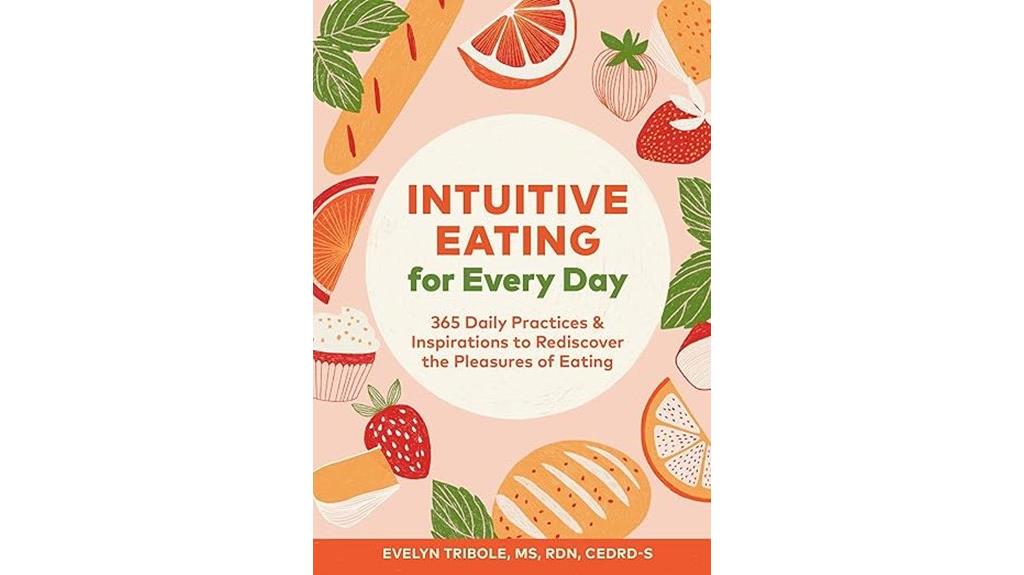
Intuitive Eating for Every Day: 365 Daily Practices & Inspirations stands out as an ideal choice for anyone seeking a gentle, practical guide to deepen their relationship with food and body. This book offers daily tips and reflections that help you break free from diet culture and build self-trust. It’s perfect whether you’re just starting or want ongoing support in your intuitive eating journey. I’ve found it visually beautiful and inspiring—each day’s practice encourages kindness, patience, and self-compassion. It’s like having a trusted friend by your side, guiding you step-by-step toward food freedom, body respect, and lasting self-acceptance.
Best For: those seeking a gentle, practical daily guide to deepen their intuitive eating journey and build a healthier relationship with food and body.
Pros:
- Offers daily practices that promote kindness, patience, and self-compassion.
- Visually beautiful design that makes the experience inspiring and engaging.
- Suitable for beginners and experienced individuals, providing ongoing support and motivation.
Cons:
- May require consistent daily commitment to see lasting results.
- Some users might find the bite-sized approach less comprehensive than full-length books.
- As a daily reflection tool, it may feel repetitive for those already familiar with intuitive eating principles.
The Intuitive Eating Workbook for Teens

Teenagers struggling with body image, societal pressures, or disordered eating will find The Intuitive Eating Workbook for Teens to be an invaluable resource. This workbook promotes a body-positive, non-diet approach that helps teens trust their internal cues and reject harmful media messages. Its practical activities and reflections are designed to foster self-acceptance and healthier relationships with food and their bodies. Many teens, parents, and professionals praise its clear, compassionate guidance. By focusing on nourishment over weight or appearance, it aims to prevent disordered eating behaviors and promote resilience against societal pressures, empowering teens to develop sustainable, intuitive eating habits that last a lifetime.
Best For: teenagers seeking a compassionate, non-diet approach to building a healthy relationship with food and body image, as well as parents and professionals supporting adolescent mental health.
Pros:
- Evidence-based, body-positive framework that promotes self-acceptance and intuitive eating habits.
- Engaging activities and reflections tailored to teens’ experiences, fostering curiosity and empowerment.
- Suitable for use in therapy, family discussions, or self-guided learning, with accessible downloadable resources.
Cons:
- May require adult guidance or facilitator support for some activities, especially in therapeutic settings.
- Not a quick fix; developing lasting habits through the workbook involves ongoing practice and reflection.
- Limited focus on specific disordered eating diagnoses, so some teens may need additional specialized support.
Intuitive Eating: A Revolutionary Program That Works
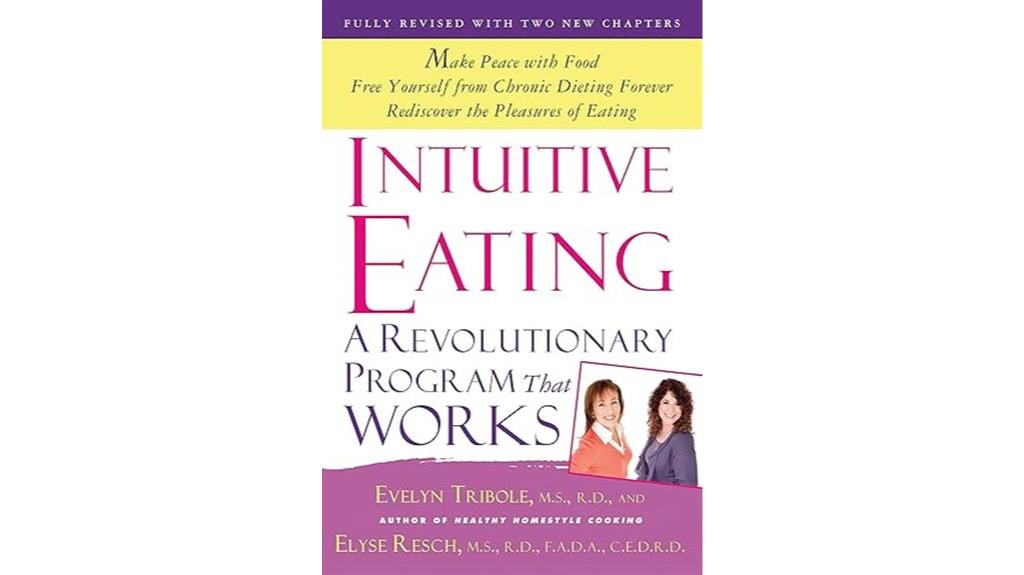
If you’re tired of dieting cycles and craving a sustainable, peaceful relationship with food, intuitive eating offers a revolutionary approach that truly works for anyone ready to reconnect with their body’s natural signals. This method focuses on honoring hunger, fullness, and emotional needs instead of restrictive rules. It’s about trusting your body’s innate cues, which humans are naturally designed to follow but often lose due to external influences. Many experience freedom from guilt, bingeing, and weight cycling, feeling happier, more balanced, and more in tune with themselves. Intuitive eating isn’t a quick fix; it’s a lifelong journey toward self-acceptance, body respect, and overall well-being.
Best For: individuals seeking to break free from dieting, develop a healthier, more intuitive relationship with food, and foster body acceptance and overall well-being.
Pros:
- Promotes a sustainable, guilt-free approach to eating that encourages self-trust and body awareness
- Helps reduce bingeing, dieting cycles, and food-related anxiety, leading to improved mental health
- Suitable for all ages and adaptable to various lifestyles, including children and families
Cons:
- May be challenging for habitual dieters to fully trust their innate cues without external guidance initially
- Requires patience, self-compassion, and ongoing practice, which might be difficult for some individuals seeking quick results
- Not a substitute for professional treatment in cases of diagnosed eating disorders, necessitating additional support
Ill Start Again Monday: Break the Cycle of Unhealthy Eating Habits with Lasting Spiritual Satisfaction
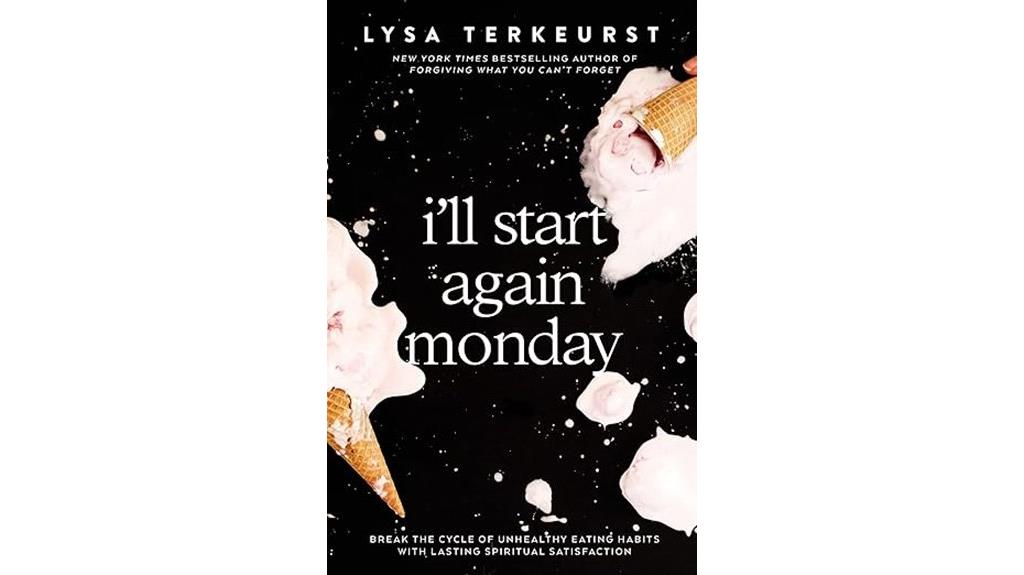
For Christian women struggling with weight or unhealthy eating habits, “I’ll Start Again Monday” offers a unique approach that emphasizes spiritual growth alongside lifestyle changes. It encourages replacing cravings for food with a desire for Jesus, promoting spiritual satisfaction as a path to healthier habits. The book focuses on honest self-assessment, addressing emotional and psychological roots of overeating through faith-based tools. Many find it inspiring, using scripture to motivate lasting change. While heavily Christian in tone, it reminds us that true fulfillment comes from cultivating a deeper relationship with God, ultimately helping break the cycle of unhealthy habits with spiritual nourishment.
Best For: Christian women seeking to address unhealthy eating habits through spiritual growth and lifestyle changes rather than dieting.
Pros:
- Emphasizes spiritual fulfillment and faith-based motivation for lasting change.
- Encourages honest self-reflection and addressing emotional roots of overeating.
- Inspires many readers to develop a deeper relationship with God while improving their health.
Cons:
- Heavy Christian focus, which may not appeal to non-Christian or secular audiences.
- Frequent scripture quotes and biblical references might overshadow the core message for some readers.
- Some find the reliance on biblical quotes and willpower approaches simplistic or less effective for lasting change.
Love to Eat Cookbook: 75 Healthy Recipes
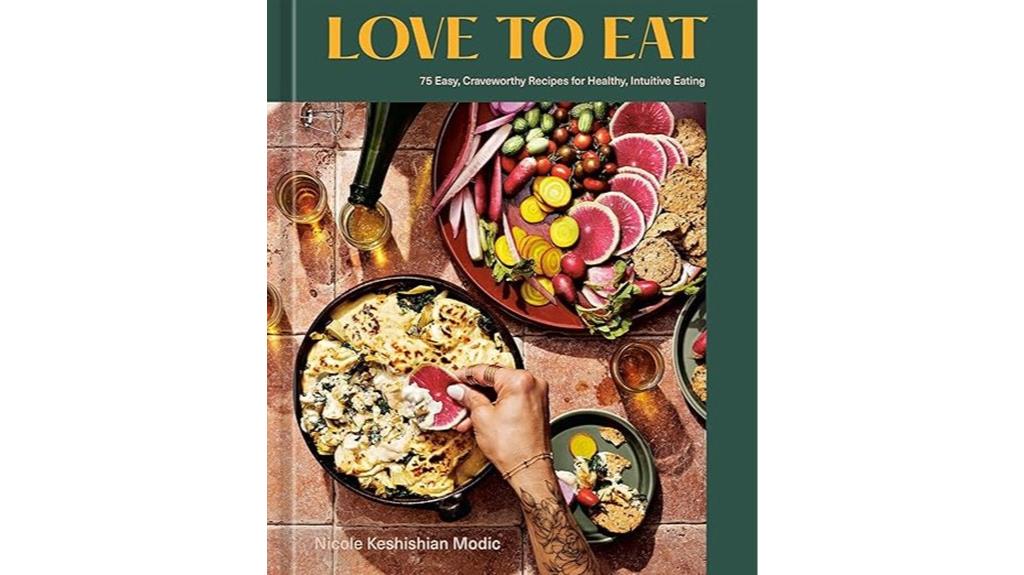
The Love to Eat Cookbook: 75 Healthy Recipes stands out as an ideal choice for anyone seeking approachable, nourishing meals that support intuitive eating and a positive relationship with food. Nicole, aka Kale Junkie, shares authentic stories and life experiences that resonate deeply, inspiring readers to heal their connections with food. The book isn’t just about recipes; it combines practical tips, dietary flexibility, and mindful eating guidance. With simple, flavorful dishes like tahini chocolate chip cookies and miso-tahini baked oatmeal, it’s perfect for everyday meals. Beautifully photographed and easy to follow, this book encourages a balanced, joyful approach to nourishing your body and soul.
Best For: those seeking accessible, nourishing, and flavor-packed recipes that promote intuitive eating and a positive relationship with food.
Pros:
- Combines delicious, healthy recipes with heartfelt storytelling and life advice.
- Offers versatile, easy-to-make dishes suitable for various dietary needs and skill levels.
- Features beautiful photography and practical tips that enhance the cooking experience.
Cons:
- Some readers may find the personal stories less relevant if they prefer purely recipe-focused cookbooks.
- The book’s emphasis on intuitive eating may require readers to adapt their mindset if they are used to strict dieting.
- As it includes a wide range of recipes, some may find certain dishes require special ingredients or substitutions.
The Binge Cure Journal: Emotional Eating Recovery Guide

The Binge Cure Journal: Emotional Eating Recovery Guide stands out as an essential resource for anyone struggling to break free from emotional eating, bingeing, or stress-related food behaviors. Dr. Nina Savelle-Rocklin’s journal offers a holistic approach by combining psychological insights, practical exercises, and emotional support. It helps you identify triggers, thought patterns, and root causes of binge behaviors while fostering self-awareness, self-control, and self-compassion. Packed with prompts and reflection pages, it encourages deep self-exploration and actionable change. Many users report lasting progress, feeling more empowered to manage urges, improve body image, and develop healthier, guilt-free relationships with food.
Best For: individuals seeking a compassionate, holistic guide to overcoming emotional eating, bingeing, and improving their relationship with food and self-love.
Pros:
- Combines psychological insights with practical exercises for deep self-awareness.
- Promotes self-compassion and body positivity, helping to rebuild self-esteem.
- Supports lasting behavioral change through reflective prompts and community engagement.
Cons:
- Might require consistent effort and commitment to see significant progress.
- Some users may find certain exercises emotionally challenging initially.
- Not a quick fix; benefits develop over time with ongoing practice.
Guide to Helping Teens Overcome Eating Disorders
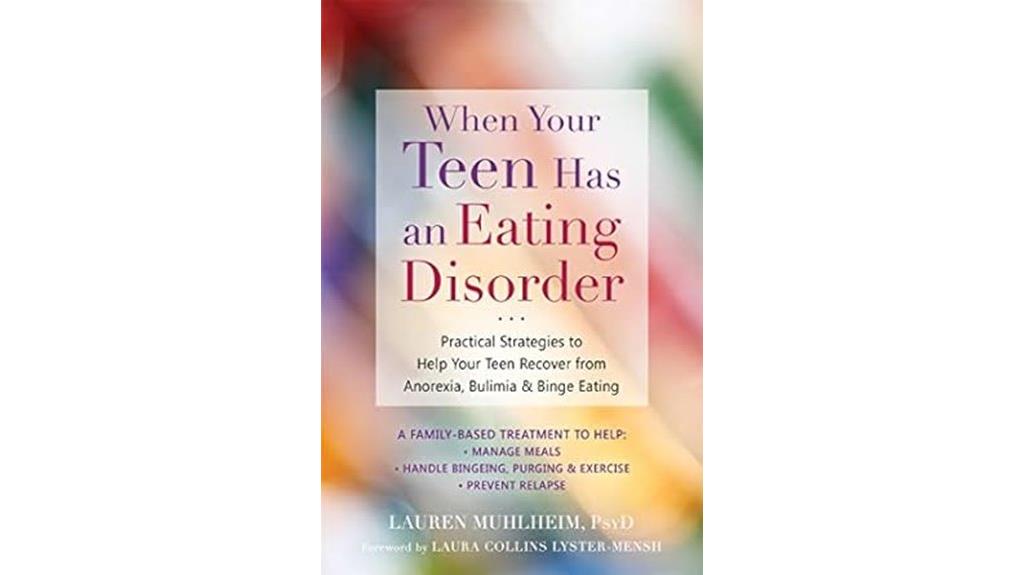
Parents and caregivers searching for practical, evidence-based guidance to help teens overcome eating disorders will find Lauren Muhlheim’s “When Your Teen Has an Eating Disorder” an invaluable resource. It offers clear, straightforward strategies for understanding, recognizing warning signs, and supporting recovery from anorexia, bulimia, and binge eating. The book emphasizes mealtime management, fostering flexible eating habits, and advocating for your child’s needs. It’s packed with tools to handle fears, validate experiences, and gradually promote independence. Praised as the “Bible” of eating disorder resources, it reassures parents and empowers them to navigate the complex recovery journey confidently.
Best For: Parents, caregivers, and clinicians seeking practical, evidence-based guidance to support teens through recovery from eating disorders.
Pros:
- Provides clear, straightforward strategies tailored for parents and professionals.
- Emphasizes family-based treatment principles like mealtime management and fostering independence.
- Offers reassurance, hope, and practical tools to navigate complex recovery challenges.
Cons:
- May require supplementary clinical training for those unfamiliar with eating disorder treatment.
- Focused primarily on family and parental guidance, less on individual therapy approaches.
- Some readers might find the content dense or technical if new to mental health concepts.
What to Cook When You Dont Feel Like Cooking – A Cookbook
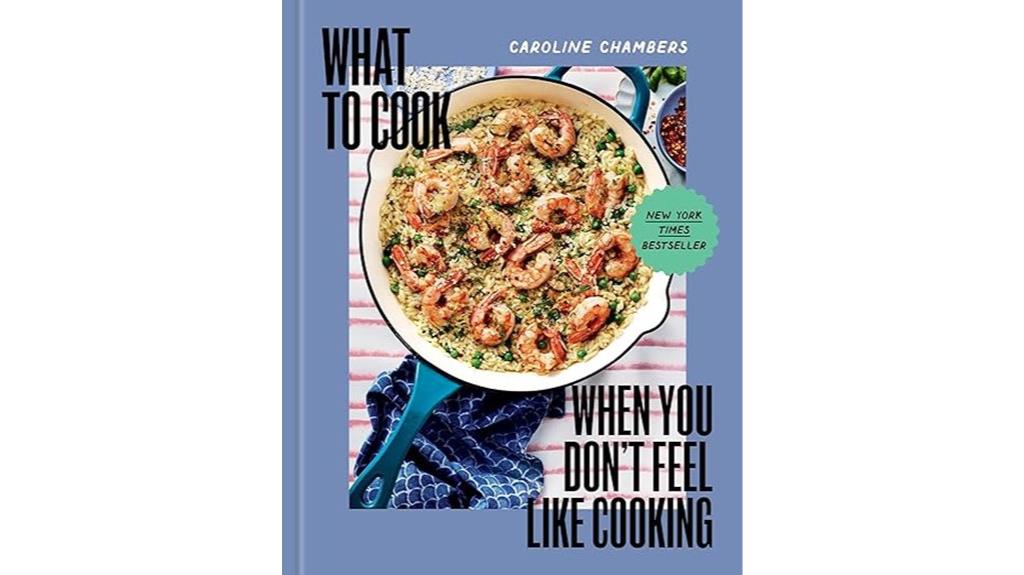
If you often feel overwhelmed or uninspired by the idea of cooking, “What to Cook When You Don’t Feel Like Cooking” offers an invigorating solution. This cookbook features simple, approachable recipes organized by prep time, making it easy to choose quick meals when you’re short on energy. With short ingredient lists, flexible substitution ideas, and straightforward instructions, it’s perfect for busy days or low-motivation moments. Many users find it boosts their confidence and rekindles joy in the kitchen, proving you don’t need elaborate dishes to enjoy tasty, satisfying meals. It’s a reliable, stress-free resource that turns cooking into a manageable and even enjoyable task.
Best For: busy individuals, beginners, and anyone seeking quick, reliable, and stress-free recipes to enjoy cooking again.
Pros:
- Organized by prep time, making meal selection quick and easy.
- Short ingredient lists with flexible substitution ideas, enhancing accessibility and customization.
- Boosts confidence and rekindles joy in cooking, transforming it into a manageable task.
Cons:
- Dense with recipes and information, which might feel overwhelming for some readers.
- Focuses heavily on meat and fish, with limited vegetarian or plant-based options.
- The organization may be less suitable for those who prefer categorization by cuisine or meal type.
How to Eat Well, Think Well and Love Fully in 10 Easy Steps
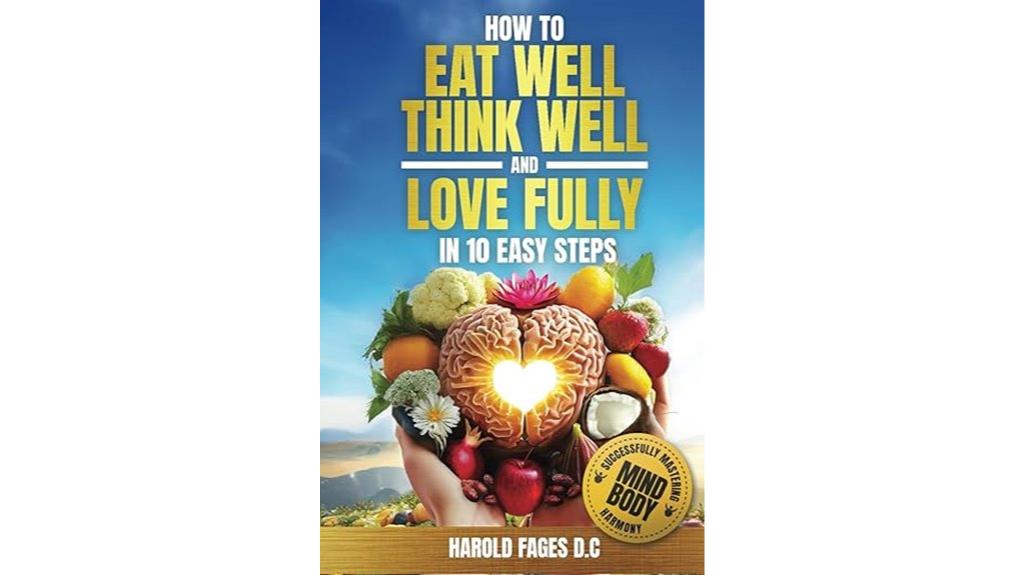
Anyone seeking a practical, approachable roadmap to improve their overall well-being will find “How to Eat Well, Think Well and Love Fully in 10 Easy Steps” especially helpful. This guide offers a holistic view, blending physical health, mental resilience, and meaningful relationships. It provides ten simple, actionable steps—like managing stress with positive thoughts, embracing change, and focusing on self-respect—that fit into busy lives. The author’s practical strategies make complex ideas accessible. By following these steps, you’ll learn to nourish your body, cultivate a positive mindset, and foster love and connection, creating a balanced, fulfilling life.
Best For: individuals seeking a practical, holistic approach to improving their physical, mental, and emotional well-being in a manageable and inspiring way.
Pros:
- Offers clear, actionable steps that fit into busy lifestyles.
- Emphasizes a holistic perspective, integrating health, mindset, and relationships.
- Uses accessible language and practical strategies to make complex concepts easy to understand.
Cons:
- May require consistent effort and self-discipline to see lasting results.
- Some readers might prefer more detailed or advanced wellness techniques.
- The broad focus might feel overwhelming for those looking for targeted, specific health advice.
Never Binge Again Book: Overeating and Binge Eating Help
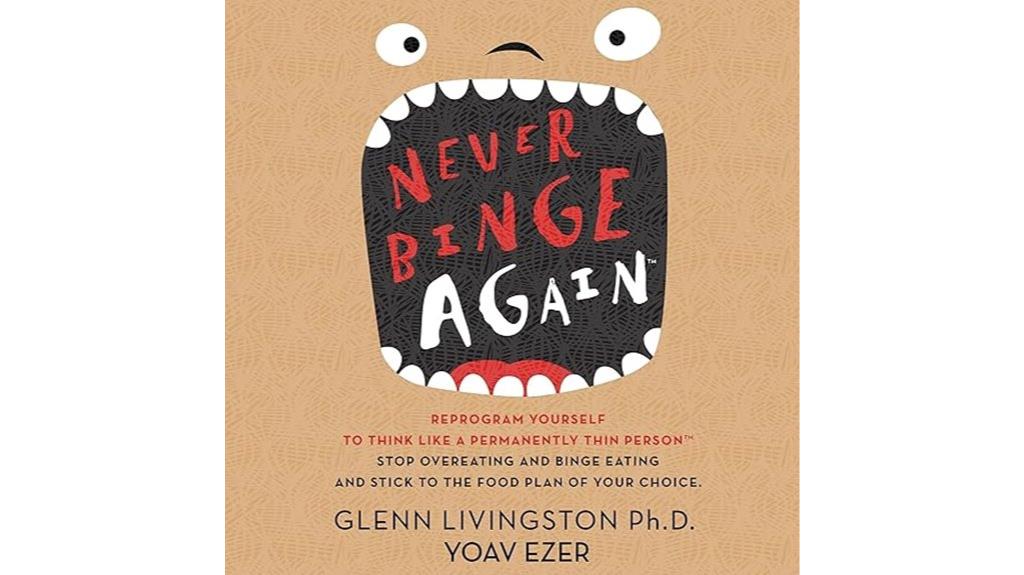
The Never Binge Again book is an essential resource for individuals struggling with overeating and binge eating who want practical, mindset-based strategies to regain control. It helps you understand that gluttony isn’t just about weight—it’s about the destructive instincts of excess and pleasure-seeking that everyone faces. The book encourages creating a mental distance from these urges, recognizing they don’t define you. It offers simple, effective techniques like establishing eating rules and talking back to primal impulses. Most importantly, it emphasizes that setbacks are normal, and consistent effort, combined with awareness and discipline, can transform your relationship with food and restore personal power.
Best For: individuals seeking practical, mindset-based tools to overcome overeating and binge eating by understanding and controlling destructive impulses.
Pros:
- Provides clear, actionable strategies centered on mental awareness and discipline.
- Emphasizes personal empowerment and the importance of creating a mental separation from destructive urges.
- Focuses on long-term mindset shifts rather than restrictive dieting, promoting sustainable change.
Cons:
- May require consistent effort and self-awareness that some readers find challenging to maintain.
- Lacks detailed nutritional guidance or meal planning specifics, focusing more on mindset than diet specifics.
- The spiritual and psychological approach may not resonate with everyone seeking purely practical or medical solutions.
Feeding Littles Lunches: 75+ No-Stress Lunches for Kids
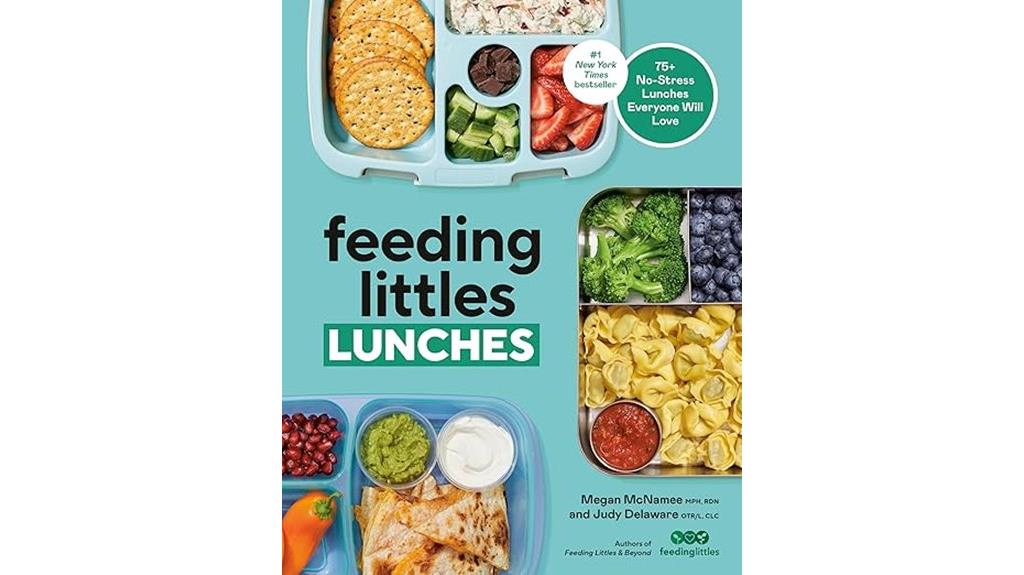
Feeding Littles Lunches offers a practical, idea-based approach perfect for busy parents who want stress-free, healthy lunch options for their kids. Instead of complicated recipes, it provides over 75 simple, realistic ideas that appeal to picky eaters and suit various ages. The visual format with colorful photos makes choosing meals fun for children and easy for parents to pack quickly. It emphasizes flexibility, safety, and wholesome ingredients, encouraging family involvement. Whether you’re dealing with toddlers or older kids, this guide helps reduce mealtime stress while ensuring your children enjoy nutritious, appealing lunches without the fuss.
Best For: busy parents seeking quick, healthy, and visually appealing lunch ideas for children of all ages, especially those with picky eaters.
Pros:
- Offers over 75 practical and simple lunch ideas that reduce mealtime stress
- Features colorful photos that make meal selection fun and encourage kids’ involvement
- Focuses on wholesome, safe, and adaptable options suitable for various dietary needs and ages
Cons:
- Lacks detailed recipes or cooking instructions for the lunch ideas
- Some users find many suggestions to be basic or repetitive, such as sandwiches and snacks
- Does not include innovative or gourmet meal options, emphasizing simplicity over novelty
When You Eat at the Refrigerator, Pull Up a Chair: 50 Ways to Feel Thin, Gorgeous, and Happy
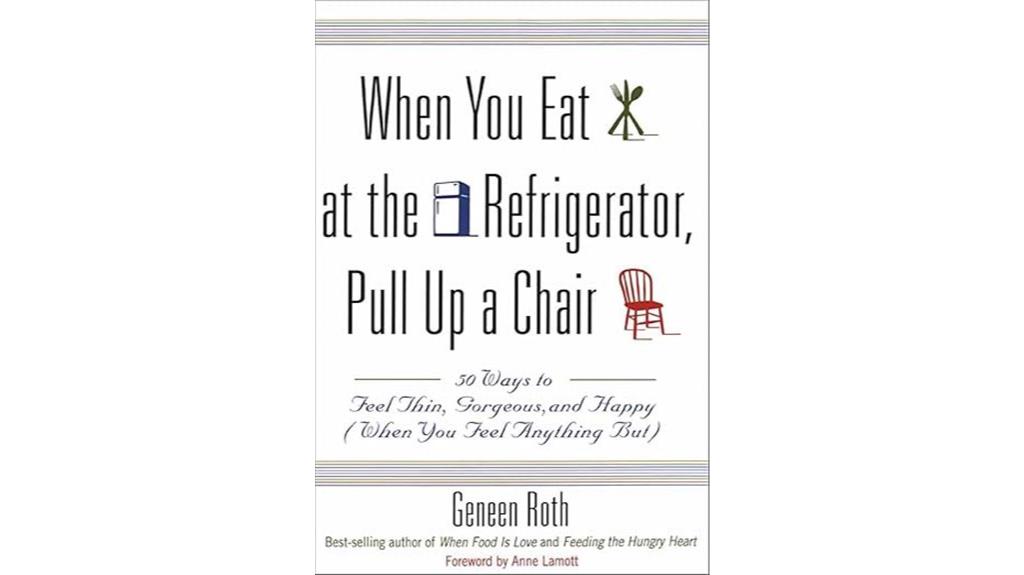
If you’re looking to break free from compulsive eating patterns and build a healthier, more compassionate relationship with food, *When You Eat at the Refrigerator, Pull Up a Chair* offers practical guidance and heartfelt encouragement. Many readers find it a crucial starting point for overcoming overeating and boosting self-love. Its honest, humorous tone helps you feel understood and supported, emphasizing kindness and self-care over dieting. The book encourages savoring food without guilt, dressing nicely, and appreciating life now—regardless of weight. Re-reading for ongoing insight, many see it as a game changer that inspires long-term change and a more positive self-image.
Best For: individuals seeking a compassionate, humorous approach to overcoming overeating and building a healthier, loving relationship with food.
Pros:
- Provides gentle, practical guidance with an honest and humorous tone that makes complex topics approachable.
- Emphasizes self-love, mindfulness, and enjoying life without guilt, fostering positive self-image.
- Recommends sustainable habits over dieting, encouraging long-term change and self-acceptance.
Cons:
- Some readers feel the book dismisses traditional dieting methods too broadly, favoring one specific diet.
- A few find Roth’s approach somewhat simplistic or commercial, with exaggerated claims at times.
- Not a comprehensive diet plan, so those seeking strict nutritional guidance may find it less detailed.
Factors to Consider When Choosing Intuitive Eating Books

When picking an intuitive eating book, I consider how easy it is to read and whether the style resonates with me. I also look at the author’s credibility and if the book offers practical tips I can apply. Ultimately, I think about whether it suits my audience and emphasizes mindfulness to support my journey.
Readability and Style
Choosing an intuitive eating book that matches your reading style can make a big difference in how effectively you understand and apply its principles. I’ve found that accessible language keeps me motivated and prevents frustration, so I look for books that explain concepts clearly without jargon. The author’s tone also matters—whether it’s conversational, compassionate, or scholarly—since it influences how I absorb the information. Relatable stories and practical examples make the concepts feel more real and easier to implement. I prefer styles that suit my learning—whether through visuals like diagrams, reflective exercises, or engaging narratives—because they help me stay engaged and retain the material. Ultimately, selecting a book that feels approachable and aligns with my preferences makes my intuitive eating journey more enjoyable and sustainable.
Author Credibility
One of the most important factors to consider when selecting an intuitive eating book is the author’s credibility, which often hinges on their professional background. A qualified author typically has credentials in nutrition, psychology, or related health fields, ensuring they understand the science behind eating behaviors. Their personal experience with intuitive eating, disordered eating, or body image issues adds authenticity and depth to their insights. Reputable authors usually support their principles with scientific research, citations, or references, making their advice trustworthy. Those with clinical experience or a history of working with diverse populations tend to offer more extensive, evidence-based guidance. Additionally, authors who contribute through speaking engagements, workshops, or peer-reviewed articles are often seen as more credible voices in the field.
Practical Application Tips
Practical application tips are essential for turning intuitive eating principles into everyday habits. When choosing a book, look for those that include exercises, journaling prompts, or step-by-step guidance to help you implement changes consistently. Focus on resources that emphasize mindful eating strategies, like recognizing hunger and fullness cues, and offer real-life tips for overcoming common obstacles. Prioritize titles that provide actionable advice on meal planning, food choices, and emotional regulation to support lasting behavior change. It’s also beneficial to select books grounded in scientific research and evidence-based practices, ensuring the guidance is credible. Ultimately, relatable examples and personal stories can inspire and motivate you to stay committed to practicing intuitive eating regularly.
Audience Suitability
When selecting an intuitive eating book, it’s important to contemplate whether the content matches your experience level and specific needs. Some books are perfect for beginners, offering foundational concepts, while others explore advanced insights for those already familiar with the principles. Consider if the book is tailored for your age or situation—whether you’re a teen, parent, or someone with an eating disorder—to ensure relevance. Also, evaluate the tone and approach—do you prefer a scientific, spiritual, or casual style? Practical exercises are key; check if the book offers tools that suit your learning style, like journaling or guided prompts. Finally, ensure the content is inclusive and respectful of diverse body types, cultures, and lifestyles, so it truly resonates with your identity and values.
Focus on Mindfulness
Choosing an intuitive eating book that emphasizes mindfulness means looking for guidance on fully engaging with your senses during meals. I look for books that teach me to notice taste, texture, and aroma, helping me slow down and savor each bite. Practicing mindfulness in eating helps me recognize true hunger and fullness cues, so I eat more intentionally and avoid overeating driven by external triggers or emotions. These books often highlight the importance of non-judgmental awareness of cravings and thoughts about food, fostering self-compassion. Scientific studies show that mindfulness reduces binge episodes and emotional eating, making me more present during meals and promoting a healthier relationship with food. Overall, mindfulness-focused books support a more satisfying, balanced approach to eating that feels natural and freeing.
Scientific Foundations
Scientific research provides strong evidence that intuitive eating is an effective approach for improving mental health, reducing disordered eating, and supporting sustainable weight management. Studies show that it enhances internal cues of hunger and fullness, helping regulate appetite and improve metabolic health. Adopting intuitive eating principles is linked to lower stress, anxiety, and body dissatisfaction, making it a holistic approach to well-being. Importantly, scientific validation confirms that rejecting diet culture and trusting internal cues doesn’t harm physical health or nutritional adequacy. Long-term research indicates that intuitive eating fosters healthier relationships with food and body over time, contributing to overall happiness. When choosing books on this topic, focusing on those grounded in scientific evidence ensures you gain reliable, effective guidance to transform your relationship with food.
Personal Relevance
Selecting an intuitive eating book that truly resonates with you can make a significant difference in your journey. When a book reflects your experiences, challenges, and goals, it feels more personal and motivating. It’s important to choose one that aligns with your values, lifestyle, and cultural background, as this makes its guidance more relevant and easier to apply. If the book addresses issues you struggle with, like emotional eating or weight acceptance, you’ll find it more useful and impactful. Personal relevance fosters a deeper emotional connection to the material, making it easier to internalize and maintain positive changes. Ultimately, selecting a book that feels tailored to your unique situation increases the chances you’ll stick with its principles and see meaningful progress.
Frequently Asked Questions
How Do I Start Practicing Intuitive Eating if I Have a History of Dieting?
If you’re new to intuitive eating after dieting, I suggest starting by ditching the diet mindset and focusing on tuning into your body’s signals. Pay attention to hunger and fullness cues without judgment. Practice self-compassion, allowing yourself to enjoy all foods without guilt. Gradually, you’ll rebuild trust with your body and develop a healthier relationship with food. Remember, it’s a process, so be patient and kind to yourself.
Are These Books Suitable for Teenagers or Just Adults?
Think of these books as gentle guides through a maze—some are perfect for teenagers, others suited for adults. I’ve found many intuitive eating books offer advice tailored to different ages, so it’s important to check the age recommendations or content focus. For teens, look for books that address their unique challenges and developmental stage. These resources can help foster a healthy relationship with food at any age.
Can Intuitive Eating Help With Emotional or Binge Eating Issues?
Yes, intuitive eating can definitely help with emotional and binge eating issues. I’ve found that it encourages listening to your body’s signals instead of emotional triggers or restrictive rules. By shifting focus from guilt to self-care, it helps you develop a healthier relationship with food. I’ve seen many people, including myself, break free from cycles of bingeing and emotional eating by practicing mindfulness and trusting your body’s natural hunger cues.
What Should I Look for When Choosing an Intuitive Eating Book?
When choosing an intuitive eating book, I look for one that feels like a gentle guide rather than a strict rulebook. It should emphasize self-compassion, listening to your body, and flexibility. I prefer books with real-life stories and practical tips, making the journey feel approachable. A good book should inspire trust and encourage curiosity, helping you reconnect with your body’s natural signals without guilt or shame.
Do These Books Address Cultural or Dietary Restrictions?
When I look for intuitive eating books, I ask if they address cultural or dietary restrictions because I believe these are important. Many books focus on general principles, but some recognize diverse needs and include adaptable advice. I look for authors who acknowledge different backgrounds and offer inclusive guidance, ensuring I can apply their insights within my unique cultural or dietary context. This makes the approach truly personal and sustainable.
Conclusion
If you’re ready to gently reshape your relationship with food, these books can be your guiding stars. They’re like friendly whispers encouraging you to listen to your body’s quiet wisdom. Remember, the journey isn’t about perfection but about kindness and understanding. So, pick the one that speaks to your heart, and take small, compassionate steps toward a more peaceful, joyful connection with food. You’ve got this—one gentle step at a time.









